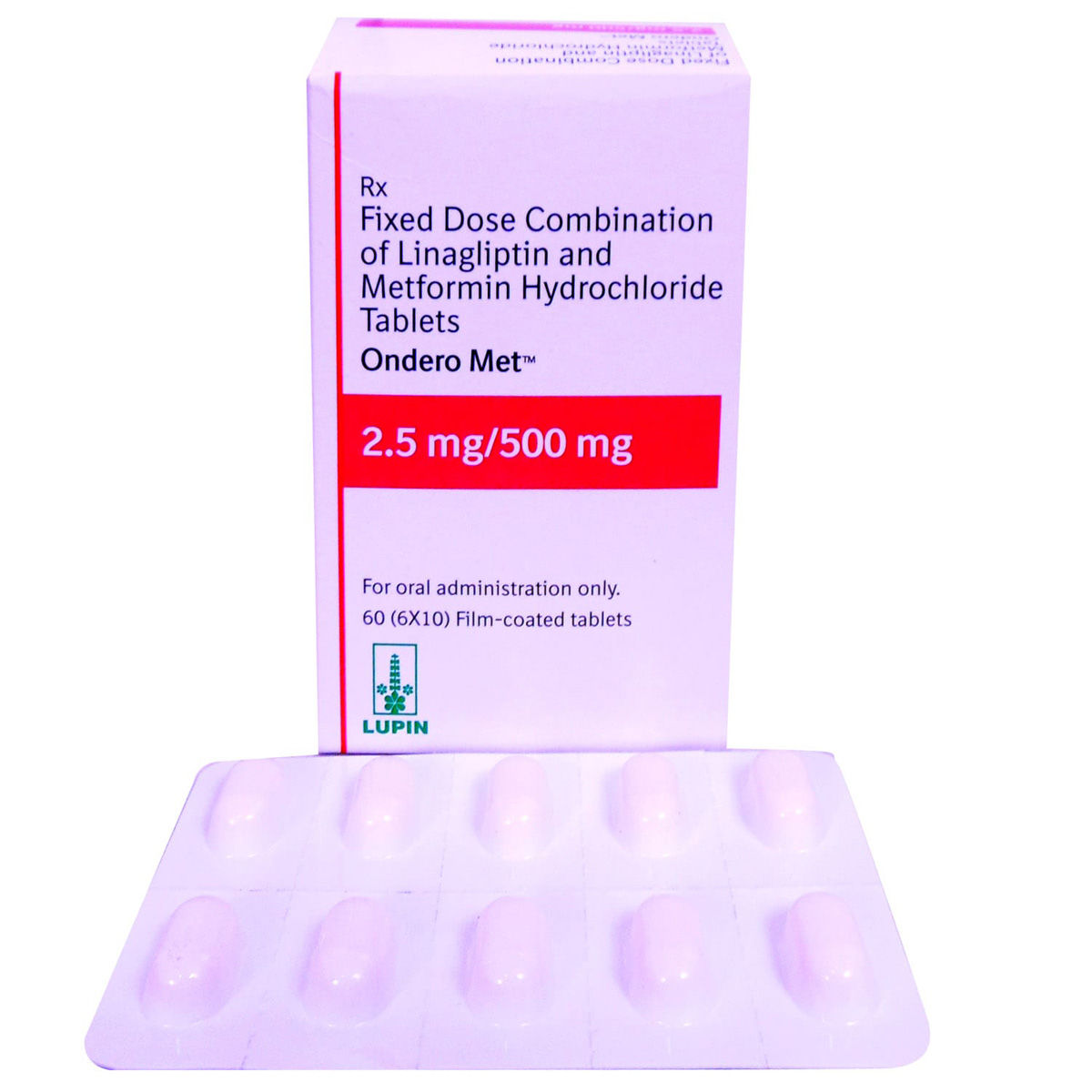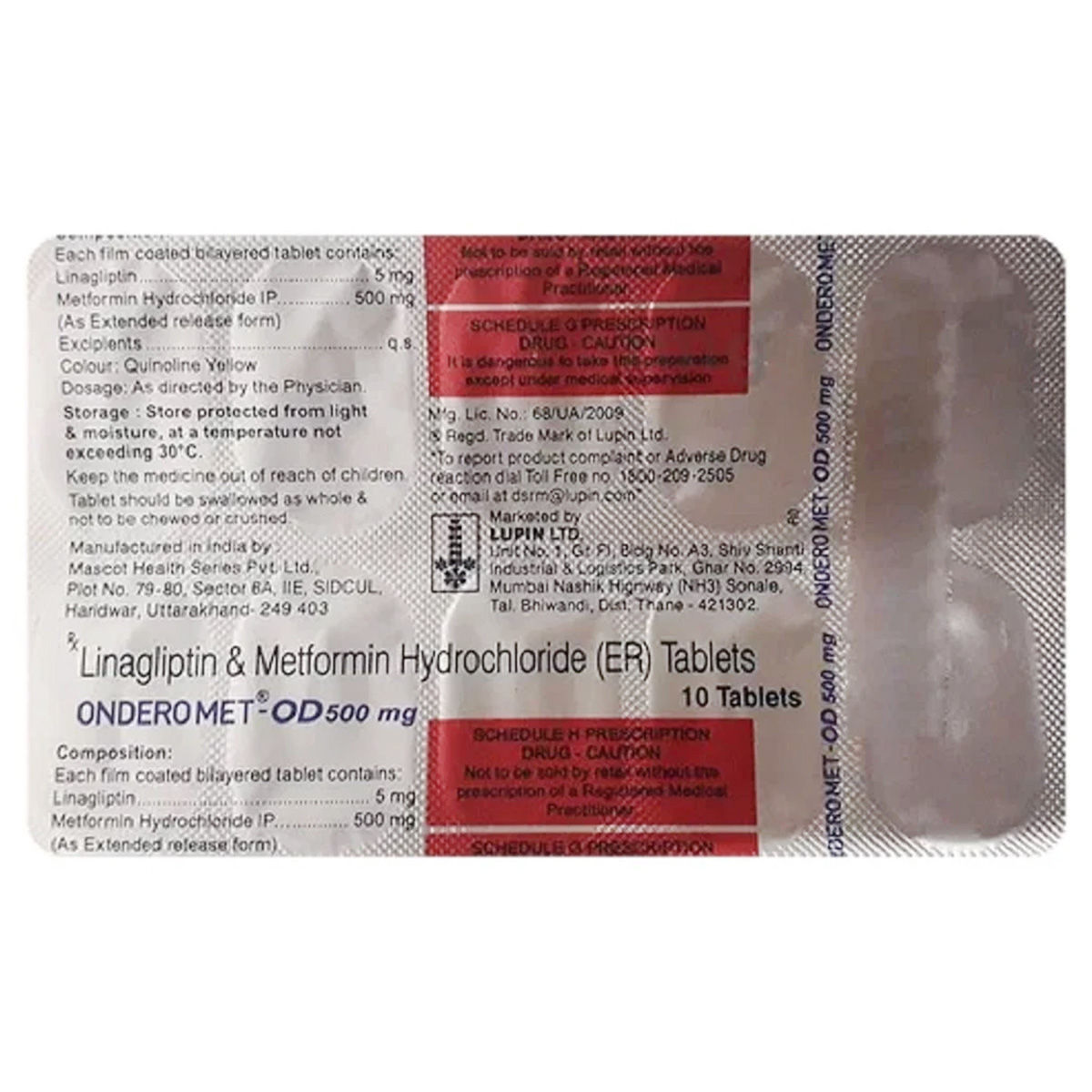Linagliptin+metformin
About Linagliptin+metformin
Linagliptin+metformin is a combination drug used in the treatment of type 2 diabetes mellitus. Type 2 diabetes develops when the body does not produce enough insulin or when the body's insulin does not work as well as it should. It can also develop if the body produces too much glucagon. Insulin is a substance which helps to lower the level of sugar in your blood, especially after meals.
Linagliptin+metformin contains metformin and vildagliptin, which help control blood sugar levels. It works by causing the pancreas to produce more insulin and less glucagon (the effect of vildagliptin) and also by helping the body utilise insulin more effectively (the effect of metformin).
Not everyone who is taking Linagliptin+metformin will get these side effects. The most common side effect of Linagliptin+metformin is hypoglycemia (low blood glucose levels) characterised by dizziness, sweating, hunger pangs, dry mouth and skin, etc. Other side effects include changes in taste, nausea, diarrhoea, stomach pain, headache, and upper respiratory symptoms.
Linagliptin+metformin should be taken with food to avoid an upset stomach. It is advised to take it at the same time each day for best results. For better advice, your doctor will determine the appropriate dose, which can change quickly depending on your condition. Do not skip your meals, and also carry a form of sugar with you to prevent low blood sugar levels.
Avoid taking Linagliptin+metformin if you are allergic to it. Linagliptin+metformin should not be stopped even if you feel better without consulting your doctor, as sugar levels may change. If you stop taking Linagliptin+metformin abruptly, it may increase your sugar levels, which could further increase the risk of eyesight loss (retinopathy), kidney damage and nerve damage. Please inform your doctor if you have any heart disease or are planning to get pregnant or breastfeed. You must continue following the diet and exercise recommended for you while on treatment with Linagliptin+metformin.
Uses of Linagliptin+metformin
Medicinal Benefits
- Linagliptin+metformin helps your pancreas produce more insulin, effectively utilise insulin, and decrease the excess sugar that your liver makes.
- It helps control the rise of blood sugar levels in your body after a meal.
- Linagliptin+metformin plays a vital role in controlling blood sugar levels and prevents serious complications of diabetes like eyesight loss (retinopathy), kidney (nephropathy), nerve damage (neuropathy), diabetic foot ulcer and delayed wound healing.
Directions for Use
• Take Linagliptin+metformin with or without food as advised by your doctor. • It is advised to take Linagliptin+metformin twice daily; however, follow your doctor’s recommendation regarding the dosage and duration. • Swallow Linagliptin+metformin as a whole with a glass of water. • Do not crush, chew or break it.
Storage
Side Effects of Linagliptin+metformin
- Low blood sugar
- Runny nose
- Sore throat
- Diarrhoea
- Nausea
- Vomiting
- Gas
- Stomach upset
- Indigestion
- General weakness
- Headache
Drug Warnings
- Inform your doctor if you are allergic to Linagliptin+metformin.
- This medicine should not be used in patients with type 1 diabetes or with diabetic ketoacidosis.
- Some diabetic patients, while taking Linagliptin+metformin, might develop a rare but serious condition called lactic acidosis (too much lactic acid accumulated in the blood) that can damage the working of your liver and kidneys, which are required for the elimination of excess lactic acid from the blood.
- Before you start taking Linagliptin+metformin, tell your doctor if you’ve ever had pancreatitis (inflammation of the pancreas), kidney disease, or a low vitamin B12 level.
- Linagliptin+metformin, when used with insulin, may significantly lower the blood sugar level, leading to a hypoglycemic condition, which can be fatal.
- Inform your doctor if you are pregnant, planning for a pregnancy or breastfeeding before starting the treatment.
- Prolonged intake of Linagliptin+metformin may lower your thyroid-stimulating hormone (TSH); hence, an annual checkup of TSH is recommended.
- In rare cases, you may also develop a severe skin reaction known as bullous pemphigoid that requires immediate medical attention.
- Inform your doctor if you are scheduled to undergo a diagnostic test that involves an injection of dye or an X-ray contrast agent. The use of Linagliptin+metformin should be stopped for a short time before having an X-ray procedure.
- It is always important to check for the expiry of the medicine. Discard the medicine if it reaches the expiry date.
Drug Interactions
Drug-Drug Interactions: Linagliptin+metformin interacts with anti-depressants (bupropion), pain killers (aspirin), antibiotics (cephalexin, ciprofloxacin), anti-acidity drugs (cimetidine), heart condition drugs (ranolazine, digoxin), anti-HIV drugs (dolutegravir), anti-hypertensives (amlodipine, verapamil), anti-epileptic drugs (topiramate, lamotrigine), oral contraceptives.
Drug-Food Interactions: Intake of excessive alcoholic beverages may increase the chance of a life-threatening condition known as Lactic Acidosis. So, avoid intake of alcoholic beverages with Linagliptin+metformin.
Drug-Disease Interactions: People affected with heart diseases (like congestive heart failure and myocardial infarction), Vitamin B12 deficiency, and alcoholism should avoid intake of Linagliptin+metformin.
Drug-Drug Interactions Checker List:
Safety Advice

Alcohol
unsafeIt is best to avoid alcohol while taking Linagliptin+metformin.

Pregnancy
consult your doctorPlease consult your doctor for advice before using Linagliptin+metformin.

Breast Feeding
consult your doctorPlease consult your doctor for advice before using Linagliptin+metformin.

Driving
cautionDrive only if you are physically stable and mentally focussed; if you experience drowsiness after taking these medications, you should not drive or operate any machinery or vehicles.

Liver
consult your doctorIf u have or had a history of any liver-related diseases, please consult the doctor before taking medicine.

Kidney
cautionIf u have or had a history or evidence of any kidney-related diseases, please consult the doctor before taking medicine.

Children
cautionIt is advisable to consult a doctor before using it.
Habit Forming
Diet & Lifestyle Advise
- Fill your half plate with starchy veggies, a quarter with proteins, and a quarter with whole grain.
- Eat at regular intervals. Do not take a long gap between a meal or snack.
- Monitor your blood sugar level regularly, especially when there are lots of fluctuations.
- Invest at least 150 minutes of moderate-intensity physical activity or one hour and 15 minutes of high-intensity exercise weekly.
- Lose weight gradually to achieve a healthy body mass index (18.5 to 24.9).
- Replace refined carbohydrates containing whole-grain foods and increase the intake of fruits, veggies, and other fibre-enriched foods.
- Reduce saturated fat (or hidden fats) intake in food like chips, crisps, pastries, biscuits, and samosas. Choose omega-3 fatty acid-containing oils for daily cooking. For frying, you can use palm oil, mustard oil, groundnut oil, rice bran oil, and safflower oil.
- Do not take stress as it may elevate your blood sugar level. You can adopt stress management techniques like mindfulness to control stress-related blood sugar changes.
- Opt for low-fat dairy products (low-fat yoghurt, fat-free milk, cheese, etc.).
- Keep your blood pressure as normal (140/90) as possible as it reduces the risk of cardiovascular diseases in diabetes patients.
Patients Concern
Disease/Condition Glossary
Type II diabetes: Type 2 diabetes is a condition where the body cannot make sufficient insulin, or the insulin that it makes doesn't work correctly or is not utilised by the body. This can cause high blood sugar levels (hyperglycemia). Type 2 diabetes symptoms include increased thirst, frequent urination at night, slow wound healing, increased hunger, fatigue, and blurred vision. There may be weight gain in some cases, while weight loss may be observed in rare cases. The complication of type 2 diabetes also includes neuropathy (nerve problems), nephropathy (kidney problems), retinopathy (damaged retina of the eyes or blindness), loss of limbs, sexual dysfunction, and an increased risk of heart attack or stroke.
FAQs
Linagliptin+metformin is used in the treatment of Type 2 Diabetes Mellitus.
Type 2 diabetes is a common form of diabetes in which the blood sugar-lowering hormone called insulin, produced by the body, does not function properly. Thus, the blood glucose level increases, and symptoms such as frequent urination, increased thirst, and increased hunger start. Diabetes, if left untreated or not treated properly, can cause long-term complications such as nerve damage, kidney damage, eye damage, foot problems, and poses a high risk of developing heart diseases.
Lactic acidosis is a rare but life-threatening condition when there is too much lactic acid built up in the bloodstream. Long term intake of Linagliptin+metformin may lead to lactic acidosis when cells get deprived of oxygen levels. Lactic acidosis symptoms include a burning sensation of muscle, muscle ache, fast breathing, nausea, and stomach pain. Immediately contact the doctor about this complication.
Do not take excessive alcohol while taking Linagliptin+metformin, as this may increase the risk of a life-threatening condition called lactic acidosis (too much lactic acid in the body).
No, Linagliptin+metformin is only prescribed to treat type 2 diabetes, also called 'non-insulin-dependent diabetes.
Linagliptin+metformin should be given with caution in older adults as they are at an increased risk of hypoglycemia. Consult your doctor; dose adjustment may be required, and take Linagliptin+metformin in dose as prescribed by your doctor.
If you feel that your blood sugar level is decreasing and you are feeling weak, immediately eat sugar candies or drink sugary beverages. It will help to balance the blood sugar level in your body. So, it is advisable to keep sugar candies with you.
Linagliptin+metformin contains Linagliptin (DPP4 inhibitors) and Metformin (Biguanide). Linagliptin is a dipeptidyl peptidase-4 (DPP-4) inhibitor that blocks the action of DPP-4, an enzyme that destroys the hormone incretin that helps the body produce more insulin only when required. It also reduces the amount of sugar produced by the liver when not needed. Metformin functions by lowering glucose production in the liver, delaying glucose absorption from the intestines and increasing the body's sensitivity to insulin. Together, it prevents blood glucose levels from rising to very high levels after meals.
Linagliptin+metformin may cause lactic acidosis. Consult the doctor if you experience symptoms of lactic acidosis, such as discomfort, muscle aches, nausea, and stomach pain.
Possible side effects of Linagliptin+metformin are low blood sugar, taste change, nausea, diarrhoea, stomach pain, headache, and upper respiratory symptoms. Consult the doctor if the side effects persist or worsen.
Linagliptin+metformin should not be taken if you are allergic to any of its components, have metabolic acidosis, diabetic ketoacidosis, or severe renal impairment.
Intake of excessive alcoholic beverages may increase the chance of a life-threatening condition known as lactic acidosis. So, avoid intake of alcoholic beverages with Linagliptin+metformin.
Store Linagliptin+metformin at room temperature, in a dry place. Keep out of sight and reach of children.
Yes, Linagliptin+metformin may cause hypoglycaemia (low blood sugar) characterised by dizziness, sweating, palpitations, hunger pangs, and dry mouth/skin. Carry sugary food such as candy or juice and consume it if you experience these symptoms.
Yes, Linagliptin+metformin may lead to vitamin B12 deficiency, particularly on long-term use. Consult the doctor if you experience symptoms of vitamin B12 deficiency, such as headache, loss of appetite, fatigue, mental impairment, numbness or tingling, and pale skin.







